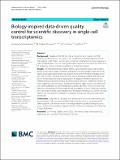Biology-inspired data-driven quality control for scientific discovery in single-cell transcriptomics
Author(s)
Subramanian, Ayshwarya; Alperovich, Mikhail; Yang, Yiming; Li, Bo
Download13059_2022_Article_2820.pdf (5.031Mb)
Publisher with Creative Commons License
Publisher with Creative Commons License
Creative Commons Attribution
Terms of use
Metadata
Show full item recordAbstract
Abstract
Background
Quality control (QC) of cells, a critical first step in single-cell RNA sequencing data analysis, has largely relied on arbitrarily fixed data-agnostic thresholds applied to QC metrics such as gene complexity and fraction of reads mapping to mitochondrial genes. The few existing data-driven approaches perform QC at the level of samples or studies without accounting for biological variation.
Results
We first demonstrate that QC metrics vary with both tissue and cell types across technologies, study conditions, and species. We then propose data-driven QC (ddqc), an unsupervised adaptive QC framework to perform flexible and data-driven QC at the level of cell types while retaining critical biological insights and improved power for downstream analysis. ddqc applies an adaptive threshold based on the median absolute deviation on four QC metrics (gene and UMI complexity, fraction of reads mapping to mitochondrial and ribosomal genes). ddqc retains over a third more cells when compared to conventional data-agnostic QC filters. Finally, we show that ddqc recovers biologically meaningful trends in gradation of gene complexity among cell types that can help answer questions of biological interest such as which cell types express the least and most number of transcripts overall, and ribosomal transcripts specifically.
Conclusions
ddqc retains cell types such as metabolically active parenchymal cells and specialized cells such as neutrophils which are often lost by conventional QC. Taken together, our work proposes a revised paradigm to quality filtering best practices—iterative QC, providing a data-driven QC framework compatible with observed biological diversity.
Date issued
2022-12-27Department
Massachusetts Institute of Technology. Department of MathematicsPublisher
BioMed Central
Citation
Genome Biology. 2022 Dec 27;23(1):267
Version: Final published version